navire - 103 Feb 2017
Kioa Picnic (Posted from Majuro January 2016) Sat Nov 14, 2015 Funafuti, Tuvalu Janet We struggled to get the dinghy up the steep coral-strewn beach. Just through the coconut palms we saw our Tuvaluan friends, Kailopa and Joseph, standing in a large open fale. It was the annual gathering of the Kioa community. These were the descendants of Kailopa's Tuvaluan people, who had migrated to Fiji sixty years ago. Earlier that morning David had collected Kailopa and his grandson Joseph from shore and brought them out to Navire where she was anchored in the lagoon at Funafuti in Tuvalu. On calm turquoise waters we motored down to the south-western end of the atoll, Joseph up the mast on bombie watch, Kailopa directing us to the far end of the island. With the dinghy well secured to a pandanus tree and Navire safely, so we thought, gently rocking on her anchor, we strolled over to the fale where Kailopa eagerly introduced us to several of his friends and family. "This is David and Janet from New Zealand," as he introduced us eagerly. "I came from Fiji on their boat." "Talofa, Talofa," they said nodding in welcome, as the story of Kailopa's passage on Navire was already widely known. I headed into the fale to check out the picnic. I was hungry. I wanted Tuvaluan food.=20 When I visit a country I need to taste it. Small groups of people were busy preparing food. A large woman in a bright yellow floral dress, sweat dripping down her face, was flouring and deep-frying chicken. The oil bubbled in a cauldron over a portable gas cooker, the chicken sizzling as it hit the oil. Sweet and sour, she told me. Doesn't sound very Pacific I reasoned. Tuvaluan culture is heavily influenced by that of Samoa, and Samoa has a strong Asian influence in their food, using rice noodles, and soy sauce in many of their dishes. Next to the sweet and sour lady a man tended two large pots, one of taro gently simmering, and another of white starchy chunks of cassava, both used in the same way we use potatoes. Outside in the midday sun several men sat under a Dr Seuss-like drooping pandanus tree playing cards and gambling with beads. I wandered over to another group of men standing around talking and laughing by a fire pit. Nearby was a man carving up a carcass and throwing large chunks into a large red plastic bowl of pig parts. One of them explained to me that they were preparing a lovo, similar to a New Zealand hangi (cooking in the ground) in which to cook the pork. "Local pork?" I asked one of the men. He made a gesture of a knife across his throat. "Still warm," he said, and grabbed my hand and laid it on the pork flesh. I swear I felt it quiver. It must have been 30 degrees already, and humid. I stepped back into the relative cool of the fale I wiped the sweat off my face with the back of my hand and dug out my water bottle. "Would you like a coconut," a young woman asked me. "Yes please!" She reached into a cooler and selected a pale drinking coconut from amongst the ice. Picking up a knife she deftly lopped off the top and handed it to me. I gratefully raised the coconut into the air, put the rough shell against my lips, tipped my head back then poured the chilled, sweet contents down my throat. Better even than a cold beer. And just as well as there was not a drop of alcohol in sight. People slept on mats on the bare concrete floor, and babies dozed on pillows. Young people wielded smart phones. But not on Facebook though, as 3G had yet to arrive. Someone set up a stereo and island music filled the air. Looking around it was obvious we were the only palangi, white people, here. Lunch clearly wasn't going to be ready any time soon so I sat under a frangipane tree and inhaled its scent, my favourite perfume. Under the next tree a man started playing a guitar and two other men joined him singing Pacific songs in three-part harmony. Meaty roasting smells wafted over with the smoke from the firepit. It doesn't get any better than this, I thought. =20 It was nearly 2pm before lunch was ready and I was salivating over the platters of food laid out on the seven metre long table. Chop suey, stir-fries, mutton curry, and platters of cassava (which they buy peeled and frozen - no land or soil to grow it in) lay beside the sweet and sour chicken, tuna and baked pork. About forty people gathered in the fale and an older serious looking man said grace, a mandatory practice in the deeply religious Pacific. Then it was all on. I eagerly dug into the trays of food, especially the pork, not carved, I ripped chunks of flesh off the bone with my hands. Next to it was a bowl of bright red sliced chilli. I copied the woman in front of me and sprinkled some on my pork. I inhaled the sweet yeasty aroma of freshly baked home-made bread. I wished I could eat it, but my wheat intolerance was a barrier to this treat. However David ate my share with relish and pronounced it indeed 'good bread'. It was the fresh tuna that made the meal, particularly as I'd learned to eat it in the 'correct' manner. They don't dally around with marinating it in lemon, or serving up wasabi, soy, or pickled ginger, it was just hunks of raw dark red fish. It was more about texture, its smooth firm flesh than flavour. "My husband caught it yesterday, " a woman behind the buffet table had told me in response to my query about how fresh it was. Looking at my plate I noticed that everything on it was imported, except the pig and tuna. There was not even a trace of lettuce or bok-choy from the local Taiwan gardens we had visited the day before. I realised it was probably going to be like this for the next six months till we got back to Fiji and lots of freshly grown produce. We could get scurvy. I needed to figure out how to use the dried seaweed in my pantry, and start growing sprouts again. Eating with my fingers local style, I paired a chunk of pork, with a chunk of cassava, relying on the pork fat for lubrication. The pork had notes of strong flavour, real pig flavour, dark and meaty. The chilli hit and I broke into a sweat, the heat nearly lifting my head off. But the flavour leapt up, it sang. Alas the pork was a little tough, needed more salt, and to be cooked longer so it was falling off the bone. =20 After lunch we piled into the back of a truck to go and watch Joseph's team play rugby. Walking across the muddy rugby field I marveled at the dark moist soil under my feet. Sitting in the stadium, carefully avoiding the rotting boards of the bench, wondering how structurally sound it was, I pondered, how come they weren't growing vegetables in this soil? How do they get this quality of soil on this sandy atoll? Kailopa sat down next to me. "You know where this soil comes from?" he asked me. "No." I scratch my head. "Fiji," he said. "It came in a barge over the open ocean." They'd bought it off an Indian guy in Lautoka. Turns out he didn't even own the soil. There is a court case under way about it, but its not as if they'll repossess it! *** 1900 It's dark out. I'm sitting naked in the cabin, listening to a Beethoven concerto, about to pour a much needed whisky. Navire is gently rocking on her anchor. What a life these two lead, you may be saying with a slight twinge of envy. Gorging themselves on local pork and tuna, drinking fresh coconuts and enjoying a local rugby game, set amongst coconut palms and tranquil turquoise waters. Well, an hour ago you wouldn't have swapped places with us. Sitting in the stadium watching the rugby, I noticed the sky getting darker and darker. At first I thought it just a squall coming through, a frequent daily event at this latitude. I looked up and stared at a long smooth dark cloud stretched across the sky. It looked more like a front than a squall, but different to storm fronts I'd seen further south. I started to feel uncomfortable. Navire was several miles away, anchored quite close to shore, near the fale. After all, we had thought, we'd be right there and could keep an eye on her. The wind started to rise. "I'm worried about the boat," I said to David. Kailopa immediately organised us a ride back to the fale. All the way back along the thin strip of island I watched the increasingly choppy sea. Time slowed down, each minute felt like an hour. At the fale I jumped out of the truck and looked out into the lagoon at Navire. She was bucking on her anchor, stern to shore, waves crashing on the beach alarmingly close. The waves threatened to swamp the dinghy as we launched her on the steep beach. David rowed hard to get us clear of the rough coral shore. It was difficult getting back on board Navire as the dinghy violently bucked up and down alongside. Aboard, David tied the dinghy off the back and went straight to the bow to raise the anchor as I started the engine and hastily turned the instruments on. I motored forward into the short steep waves as David started winching the anchor in. Once the anchor was off the ground, but not yet up on deck, it was hard to keep the bow of the yacht facing into the wind and waves. I motored ahead slowly but the bow would drop off and I'd have to increase the revs to get it back up, but then drop the speed as I didn't want to run over the chain and have it shredding the paintwork on the bow, or make the bashing up and down movement any worse for David. Meanwhile behind the boat the short steep chop was bouncing the dinghy around smashing it into the wind-vane. I hauled it alongside and tied the painter to a winch all the while trying to keep head to wind. I noticed our boarding ladder was being wrenched out of its fittings by the waves but neither of us could leave our posts to rescue it. Anchor up, we bashed through the waves back towards the main anchorage, the light dropping fast. Because we'd had our local navigator on the way over we hadn't had the GPS on and had no handy track to follow back. The howling wind clocked 30 knots. With David back in the cockpit and steering I quickly rescued the ladder before it succeeded in its bid to escape. Unable to see most of the rest of the yachts in the heavy rain at the anchorage we found a space and dropped the anchor but we were not finished yet. We had to get the dinghy up on deck, a difficult job in the high winds. Twenty minutes later the wind dropped and the sea calmed, just like that. It was a salutary lesson on how vulnerable we were in this area of the Pacific. There was no real shelter from now on, no land higher than two or three meters. I took a sip of my whisky and pondered the many flavours of the day. =20
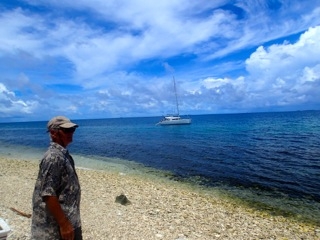
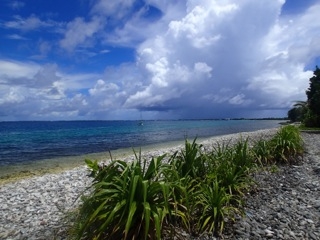
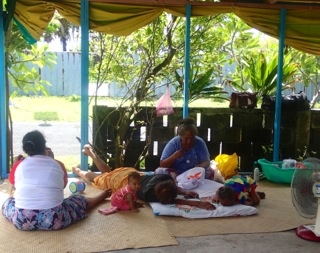
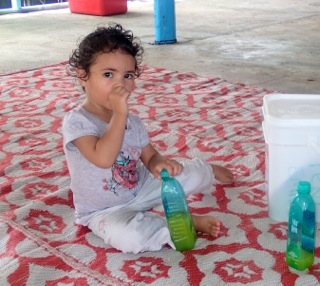
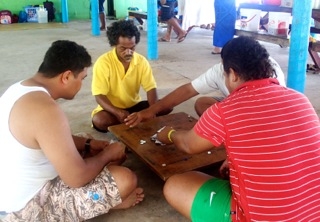
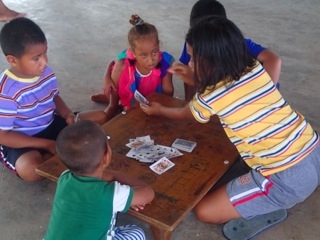
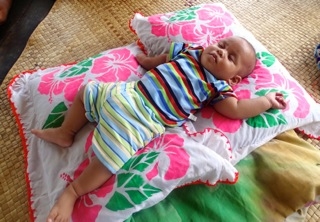
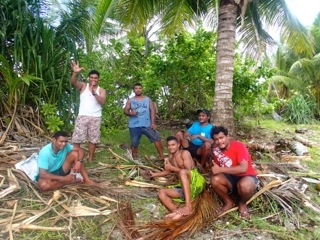
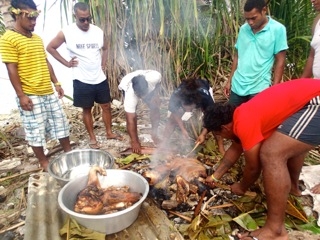
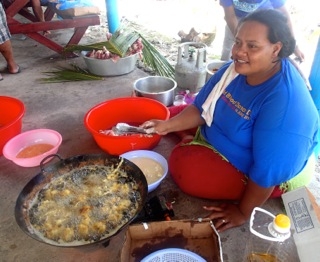
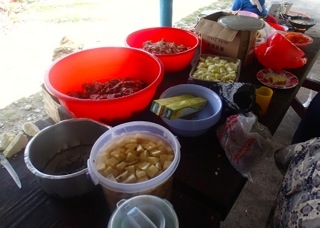
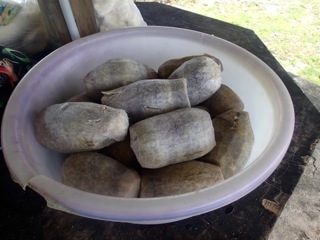
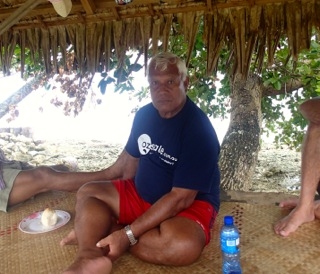
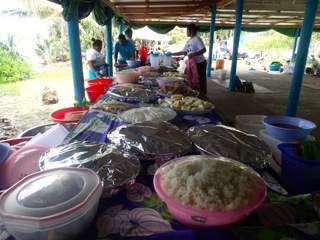
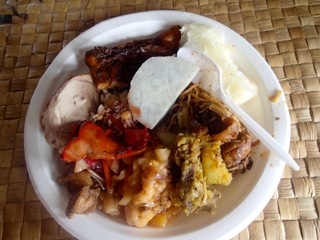
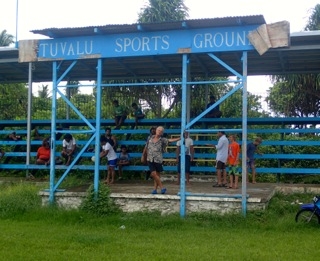
Add new comment